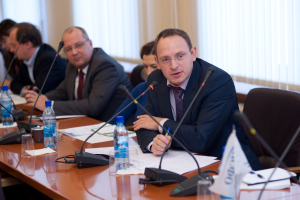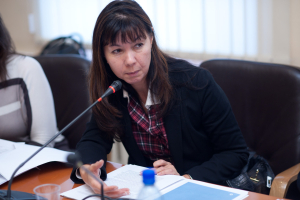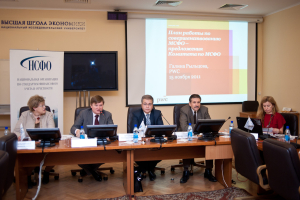 On November 15, 2011 the NOFA Foundation organized the Round Table devoted to the discussion of IFRS development program and the opinion of the Russian professional community. The Round Table was organized in association with the Finance Ministry of RF and was held at the Higher School of Economics. In the framework of the Round Table in which representatives of accounting profession and expert community participated, the three-year work plan of the International Accounting Standards Board was discussed.
On November 15, 2011 the NOFA Foundation organized the Round Table devoted to the discussion of IFRS development program and the opinion of the Russian professional community. The Round Table was organized in association with the Finance Ministry of RF and was held at the Higher School of Economics. In the framework of the Round Table in which representatives of accounting profession and expert community participated, the three-year work plan of the International Accounting Standards Board was discussed.
Galina Ryltsova, Partner in Accounting Consulting Services Group of PricewaterhouseCoopers,
introduced to the participants of the Round Table the IASB Agenda Consultation document published by IASB in order to get commentaries from all the interested parties. The document defines IASB proposals regarding its future work plan aimed at providing a balance between strategic tasks of standard setting and vital problems of financial reporting. In the framework of this document the IASB identifies two categories of its strategic priorities and five strategic areas within them. The first category of strategic development “Developing financial reporting” unites three sub-categories – “Strengthening the consistency of IRFS in the conceptual framework”, “Investing in research and addressing the strategic issues for financial reporting to aid future standard-setting” and ‘Filling gaps by undertaking standards-level projects developing new IFRS or making major amendments. The second category “Maintaining existing IFRs” includes two sub-categories – “Improving a better understanding of better understanding of operational issues of new IFRSs and major amendments through conducting post-implementation reviews” and “Improving the consistency and quality of the application of IFRSs”. The document states that the IASB realizes that it is necessary to take into consideration the views of all the interested parties and the needs of the national regulators. The document also states that the agenda is constrained by time needed by users and compilers of financial reporting to study the IASB proposals and to respond,
 time needed by users and compilers of financial reporting to introduce new IFRSs, limited staff resources and the necessity to collaborate with national standard-setters and the balance between the number and size of new projects and the speed with which they can be completed. The document notes the following projects considered to be priorities: revenue from contracts with customers, leases, insurance contracts, financial instruments including hedge accounting, impairment of financial assets measured at amortized cost, offsetting of financial assets and financial liabilities. Besides, the IASB intends to undertake the following projects: continuing work on the Conceptual Framework; performing post-implementation reviews; performing three-year review of the IFRS for SMEs; investing in research in preparation for future standard-setting needs and undertaking minor amendments to IFRSs through the Annual improvements process. In conclusion Galina Ryltsova noted that the IASB planned to get views from all the interested parties on the following basic issues: - What should be the IASB’s strategic priorities and how should it balance them over the next three years? - What are the most pressing financial reporting needs for standard-setting action from the IASB?
time needed by users and compilers of financial reporting to introduce new IFRSs, limited staff resources and the necessity to collaborate with national standard-setters and the balance between the number and size of new projects and the speed with which they can be completed. The document notes the following projects considered to be priorities: revenue from contracts with customers, leases, insurance contracts, financial instruments including hedge accounting, impairment of financial assets measured at amortized cost, offsetting of financial assets and financial liabilities. Besides, the IASB intends to undertake the following projects: continuing work on the Conceptual Framework; performing post-implementation reviews; performing three-year review of the IFRS for SMEs; investing in research in preparation for future standard-setting needs and undertaking minor amendments to IFRSs through the Annual improvements process. In conclusion Galina Ryltsova noted that the IASB planned to get views from all the interested parties on the following basic issues: - What should be the IASB’s strategic priorities and how should it balance them over the next three years? - What are the most pressing financial reporting needs for standard-setting action from the IASB? 
Dmitry Weinstein, Partner of Ernst & Young’s, introduced to the participants of the Round Table comments on the short-term IASB’s proposed work plan made by the National Accounting Standards Board. He noted, in particular, that the Accounting Standards Board considers that in the nearest future the AISB should focus on realization of the following: completion of the projects undertaken in the framework of convergence of IFRS and US GAAP; accumulation and implementation of the best practices of IFRS s implementation; completion of the work on the Conceptual Framework. Besides, the International Accounting Standards Board includes into the work plan the “IFRS Clarity Project” with the aim of IFRS classification and unification of terminology and clarity of the language, which is especially important for those countries where principle-based standards have not been previously used for financial statements and English is not an official language. Taking into account that IFRSs are adopted in an increasing number of jurisdictions the National Accounting Standards Board recommends that one of the IASB’s priorities should be further development of the system of interaction between the IASB and national financial reporting standard-setters to ensure
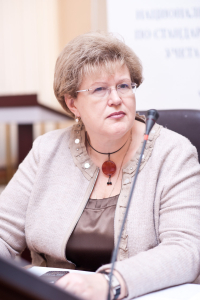 unification of standard interpretation in different countries. As strategic priority the National Accounting Standards Board recommends that the IASB should focus on maintenance of the existing IFRSs and take conceptual decisions regarding the balance between disclosure of a considerable volume of information and its clarity for a wide range of users and whether application of “balance sheet” or “profit and loss” approach should be dominating in determining entity’s financial results. In terms of developing new IFRSs the IASB should complete its work related to the major standards being developed (financial instruments, leases, revenue recognition, insurance contracts). Besides, Dmitry Weinstein noted that the National Accounting Standards Board recommends the IASB to focus on the projects of high importance for emerging economies with priority given to projects on accounting for business combination or business reorganization under common control and projects related to combined and carve-out financial statements. The following projects are of special interest for emerging markets: accounting for government grants, standard on agriculture and implementation guidance for fair value measurement in emerging markets. Besides, the National Accounting Standards Board believes that the following projects should be included
unification of standard interpretation in different countries. As strategic priority the National Accounting Standards Board recommends that the IASB should focus on maintenance of the existing IFRSs and take conceptual decisions regarding the balance between disclosure of a considerable volume of information and its clarity for a wide range of users and whether application of “balance sheet” or “profit and loss” approach should be dominating in determining entity’s financial results. In terms of developing new IFRSs the IASB should complete its work related to the major standards being developed (financial instruments, leases, revenue recognition, insurance contracts). Besides, Dmitry Weinstein noted that the National Accounting Standards Board recommends the IASB to focus on the projects of high importance for emerging economies with priority given to projects on accounting for business combination or business reorganization under common control and projects related to combined and carve-out financial statements. The following projects are of special interest for emerging markets: accounting for government grants, standard on agriculture and implementation guidance for fair value measurement in emerging markets. Besides, the National Accounting Standards Board believes that the following projects should be included 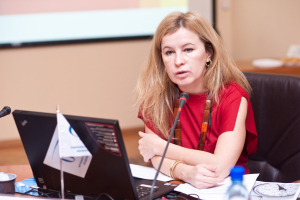 into the IASB’s agenda: transactions with intellectual property, interim reporting, separate financial reporting, financial reporting in situations when the “going concern” assumption is not appropriate. The National Accounting Standards Board recommends the IASB to incorporate the Conceptual Framework into the official translation of IFRSs to be applied at the national level because it can effectively enhance the quality of IFRS application in those countries where IFRSs have been legally enacted. In conclusion, Dmitry Weinstein noted that the proposals made by the National Accounting Standards Board are not final and it is planned to prepare a comment letter addressed to the IASB following this Round Table discussion of the IASB Agenda Consultation.
into the IASB’s agenda: transactions with intellectual property, interim reporting, separate financial reporting, financial reporting in situations when the “going concern” assumption is not appropriate. The National Accounting Standards Board recommends the IASB to incorporate the Conceptual Framework into the official translation of IFRSs to be applied at the national level because it can effectively enhance the quality of IFRS application in those countries where IFRSs have been legally enacted. In conclusion, Dmitry Weinstein noted that the proposals made by the National Accounting Standards Board are not final and it is planned to prepare a comment letter addressed to the IASB following this Round Table discussion of the IASB Agenda Consultation.
